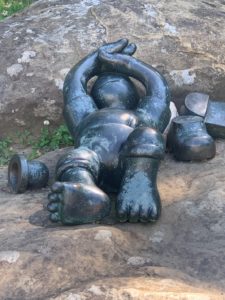Finding Rest in God in the Information Age
Bronze Sculpture by Tom Otterness displayed at Western Washington University, Photo by Geri E. Forsberg
“Woe to me! I am worn out with groaning and find no rest” (Jer 45:3).
In today’s digital culture, a person can literally be busy 24/7. We have more information available to us than ever before in history. We can find anything with an internet search. As professors, we all know the feeling of information overload. So much to read, so much to consider, and so much to think about.
Throughout the Bible, writers talk about the importance of rest. Some writers lament that they have no rest. Job said, “I have no peace, no quietness; I have no rest, but only turmoil” (Job 3:26). The psalmist wrote, “My God, I cry out by day, but you do not answer, by night, but I find no rest” (Ps 22:2). And Jeremiah wrote, “Woe to me! I am worn out with groaning and find no rest” (Jer 45:3).
The word rest in the Bible is used in many ways. The first way that we find it used is by God Himself. In Genesis, the Bible says that after God finished His work, He rested on the seventh day. Even God knew the importance of resting. And He modelled it for us. He then instructed us to take a sabbath day of rest. Lest we think that the sabbath is just for Old Testament believers, the New Testament writer in the book of Hebrews says that “There remains a Sabbath-rest for the people of God.” (Heb 4:9)
As professors it is sometimes hard to take a day of rest. I know it is for me. There are always more papers to grade and more articles to write. But somehow when I take time to rest and get refreshed, God multiplies the time during the other six days.
Another way that the Bible uses the word rest is in the sense of finding our rest in God. As David writes in the Psalms, “Truly my soul finds rest in God; my salvation comes from him” (Ps 62:1). I believe that as human beings we long for a rest of peace in our innermost beings. This is a rest that is free from anger, free from agitation, free from turmoil, and free from the devastating consequences of living in a fallen world.
But where can we find such a rest? David writes that it can be found in God alone. He is our source of rest, of peace, and well-being. By taking time daily in God’s Word to meditate on His truth, we can find rest for our souls. With Christ, we can pour out our deepest longings to Him knowing that He hears and answers us when we come to Him.
At Western Washington University where I teach, I try to join with other professors and staff each week for a time of prayer. During this COVID-19 time we have been meeting to pray on Zoom. It is a wonderful time to join with other Christ followers to come before the Lord with our needs and to place our trust in Him. In Him we can find rest for our souls.
A third sense of the word rest in the Bible is used in Isaiah where the writer says, “The Spirit of the LORD will rest on him—the Spirit of wisdom and of understanding, the Spirit of counsel and of might, the Spirit of knowledge and fear of the Lord” (Isa 11:2). Not only can we take a day of rest, find our rest in the Lord, but the Lord’s Spirit can rest or reside on us. And His Spirit can give us all that we need as professors—wisdom, understanding, counsel, knowledge, and the fear of the Lord.
May we as Christian professors allow the Holy Spirit to rest on our lives so that we can be light in our world.
Reflection: Am I enjoying a sabbath rest—a day with the Lord? Am I experiencing rest in God’s Word as I meditate on His truth? Am I experiencing the Spirit of the Lord resting on me?
Today’s Challenge: Make a decision to take a sabbath day—a day of rest one day a week this month. See how much better life is as you take time to rest. Take time each day to find rest by meditating on God’s Word. Consider going away for a day alone with the Lord where you can spend time in prayer and in His Word. Before you write, speak, or teach, ask the Holy Spirit to rest on you, to give you His wisdom and counsel.
-Geri Forsberg, Western Washington University


